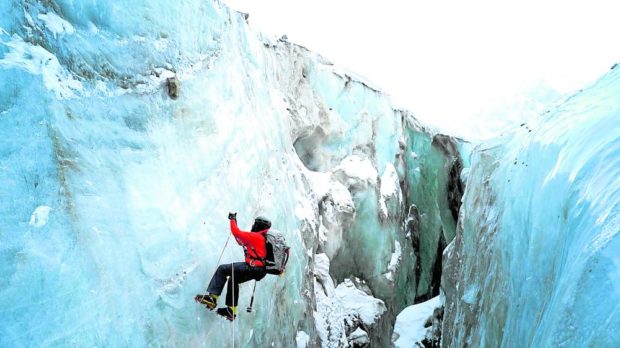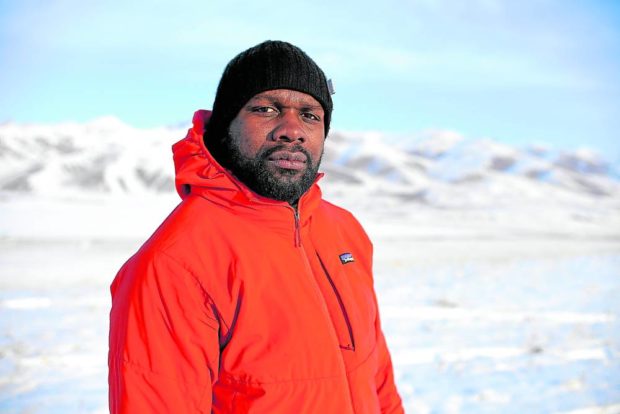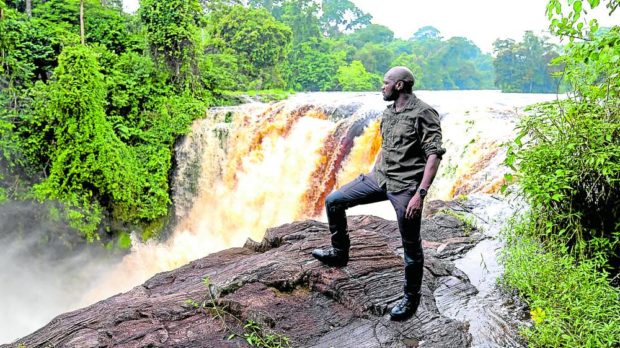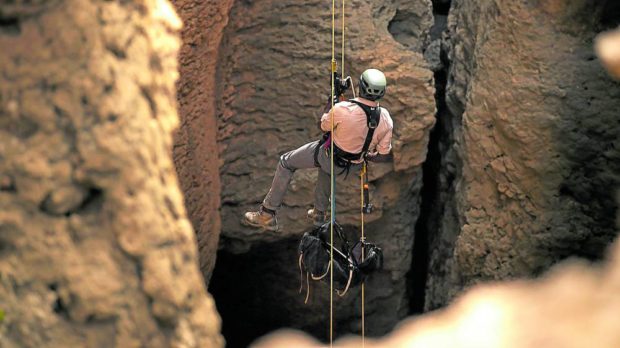How ‘7 Toughest Days’ helped explorer Dwayne Fields escape violent past
While some extreme explorers go off the beaten track to push their limits and satisfy their hunger for adventure, Jamaica-born British survivalist Dwayne Fields’ escape into nature was prompted by his desire to turn his back on the gang-driven violence of living in inner London.
After an attempted shooting almost cost him his life, Dwayne decided to turn his life around, setting himself on the first of many challenges—and look where that brought him!
In 2010, he became the first Black Briton to walk over 400 nautical miles to reach the North Pole, making him only the second Black man in the world to pull off this undertaking after Matthew Henson did the same in a 1908-1909 expedition.
Dwayne’s latest adventure can be seen in National Geographic Channel’s three-part series “7 Toughest Days,” which will telecast his trip to Kyrgyzstan at 11 a.m. and 10 p.m. today. In the show directed by Charlie Bingham, Dwayne must survive some of the world’s harshest environments during their deadliest times of the year.
In Kyrgyzstan, one of the highest places in the world—94 percent of it made up of mountains—located in Central Asia, Dwayne is tasked to hurdle subzero temperatures and avoid the constant threat of debilitating blizzards and deadly avalanches as he descends 5-kilometer high peaks on the Tien Shan mountain range. He is in a mad rush to reach a tribe of nomads before the group retreats for the winter.
Article continues after this advertisementIn Gabon, the most forested country in Africa (where almost 90 percent consists of rainforests), Dwayne is pushed to his breaking point as he takes on impenetrable jungles, raging rivers and waterfalls, while avoiding crocodiles, wild elephants and chameleon-like snakes.
Article continues after this advertisement‘A sight to behold’
The 39-year-old explorer must rely on the kindness and hospitality of the indigenous Baka tribe, who teaches him mud fishing and later directs him to an underground cave that will considerably shorten his trek to his extraction point.
Meanwhile, in scorching Oman in southeast Arabia (where 82 percent is made up of desert), Dwayne crosses the arid desert on the Al-Hajar mountains in a desperate quest for water. But just as he’s about to give up, he discovers a vast underground cavern about 400 feet below the surface that leads him to a picture-perfect oasis—truly a sight to behold!
Back in the scalding-hot surface, an endless sea of sand dunes awaits him and leads him to the Bedouin tribe that’s waiting to rescue him.
From somewhere very cold to somewhere very hot to somewhere extremely soggy, the series certainly puts Dwayne through his paces.
When we spoke to the TV show host in a one-on-one interview last week, we asked him how he and his team chose the places to go to and which of them he’d consider the toughest.
Dwayne said, “Each of them is challenging for different reasons, but I’d say Kyrgyzstan was the toughest. The locations were picked by myself and the team. They’d ask me, ‘Dwayne, what’s on your bucket list?’ And from there, we discuss which ones are more extreme than others, and we break them down.
“Over time, we decide to go somewhere high, somewhere hot, somewhere with dense jungles, then we look at a map and say, ‘What’s the most forested country in the world? Is Gabon accessible?’ If it is, let’s go there.
“Personally, I don’t know anybody who’s been to Kyrgyzstan. On the other hand, Oman is one of the few places on the planet where it gets extremely hot. It’s really remote, but it’s also accessible enough that it wouldn’t take us six months to get there.
“Those are the reasons why we chose those three places. In terms of preparation, it was so difficult because, we sometimes get into this false sense of security because we think, ‘Oh, we’ve done it before—it’ll be fine.’
“I’ve climbed mountains and scaled high altitudes before. But the thing is, you can climb Mount Everest 10 times, but on the 11th time, you might experience altitude sickness—and no one knows exactly why. But when you combine altitude sickness with extreme cold and fatigue, it just becomes a miserable experience.
“Gabon had its own challenges. When you’re in a jungle, a small scratch can become infected. It could lead to septicemia—and that can be a showstopper. Meanwhile, in the desert, there’s extreme heat, so you start to feel dehydration and dizziness, which can impair your focus and decision-making process. When your energy level drops, you can make wrong decisions and that’ll be your downfall.
“Like you, I hope every other person who watches the show sees it the way you did. And I want them to say, ‘Oh, I want to see how beautiful it is for myself!’ Then, they’re going to fall in love with it and realize that it’s worth protecting and preserving for the next generation to enjoy.”
Dwayne wanted to leave the dangers of city life to explore nature where, ironically, danger also lurks at every corner. Does he feel more at home in the wilds than in UK’s urban jungles?
“I’ve lived in the city most of my life,” he said. “I mentioned before that I was born in an area [surrounded by] woodlands. That’s where I began pushing myself and building my confidence as a kid. But when I started living in the city (at age 6), that was the first time that I felt real pain.
In danger
“Before that, I’d been stung by animals, bitten by this or scratched by that. But when I moved to London, it was the first time that my life was actually in danger. Seriously, I’ve not felt that my life was ever at risk in these natural environments, other than one or two close calls and hairy moments. It was only in big cities where I’ve been stabbed. But I’ve been lucky to get to the stage where I can now choose where danger is coming from.
“The gun incident in the city was a near-death experience for me that kind of encouraged me to step outside the urban life and start pursuing my passion. So, spending time outside London is a choice. I feel more empowered because I’m choosing where I go and picking the threats and dangers I get exposed to. I just prepare myself for them.”Dwayne has a lot of young followers. What advice would he dispense if asked about the minimum requirements to pursue his adventure-seeking lifestyle? More importantly, would he encourage people to follow in his footsteps?
He answered, “For anybody, whether young or old, who wants to do something like this and it’s his or her first time to dip those toes into the water, I’d say, ‘Start small, and start locally. Start in your home country or in your hometown, then work your way up as you do more and more while your skills continually grow.’
“My skill set is constantly growing, and I’m surrounded by some of the best people. Also, I always meet people locally to find out what they know and learn from their experiences. I do some background reading and training as well. I make sure I’m up to scratch.
“So, I’m encouraging anyone who wants to do this… just do it! And more power to you. But take your time—do it slowly and build on it.”
Dwayne mentioned in the series’ Gabon episode that there are around 30 species of deadly snakes inhabiting those jungles. Does he carry an antidote with him as a precaution?
“No, I don’t,” he admitted. “But we have a medic and we do have access to medical care should we need it in worst-case scenarios. We can also radio for help if it comes to that. But remember that most of these animals are not out to bite you. Of course it will if you step on it, so yes, there’s always that risk.
“But snake bites are very rare generally worldwide. Also, the antidote for venom is very expensive, and we don’t want to waste it. But I can tell you now that in that particular episode, you saw less than half the snakes that we came across.”
When we asked Dwayne what he wants viewers to take away from his life and the show itself, he mused, “I want every one of them to enjoy the show and learn a lot from it. I want them to think that, ‘If Dwayne can do it, maybe I can do it too! If he can teach that, maybe I can teach that same thing to somebody else.’
“I want everyone to come away from ‘7 Toughest Days’ feeling inspired, empowered, uplifted and motivated enough to go out and try it themselves.
“From my life, I want everyone to say, ‘Well, perhaps my life isn’t so bad because I’ve seen what Dwayne went through and he was able to move on and do these amazing feats.’ I want them to say, ‘Dwayne went through all that, so why can’t I?’” INQ
“7 Toughest Days: Kyrgystan” premieres at 11 a.m. today on National Geographic Channel (channels 41/195 on SkyCable). All three episodes can also be streamed on Disney beginning March 1.



